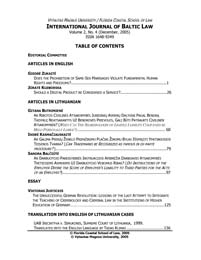AR RIBOTOS CIVILINĖS ATSAKOMYBĖS JURIDINIŲ ASMENŲ DALYVIAI PAGAL BENDRĄ TAISYKLĘ NEATSAKANTYS UŽ BENDROVĖS PRIEVOLES, GALI BŪTI PATRAUKTI CIVILINĖN ..
WHETHER THE SHAREHOLDERS OF LIMITED LIABILITY COMPANY MAY BE HELD PERSONALLY LIABLE FOR COMPANYS‘ OBLIGATIONS EVEN IF THE GENERAL RULE IS ...
Author(s): Gitana ButrimieneSubject(s): Law, Constitution, Jurisprudence
Published by: Florida Coastal School of Law and Vytautas Magnus University School of Law
Keywords: shareholders; limited liability; company; liable; obligations
Summary/Abstract: WHETHER THE SHAREHOLDERS OF LIMITED LIABILITY COMPANY MAY BE HELD PERSONALLY LIABLE FOR COMPANYS‘ OBLIGATIONS EVEN IF THE GENERAL RULE IS THAT THEY MAY NOT? As a general rule the loss of a shareholder of limited liability company is limited to the amount that he had invested in that enterprise. However, there are few exceptions that derive primarily from the principles of reasonability, justice, proportionality and legal certainty. This article analyse those exceptions in the light of legislature and case law of western countries and Lithuania. According the Civil Code of Lithuania the first exception is when shareholders of the company agree to personal liability in the articles of the corporation. The second one is when the company can’t fulfill its obligations as a consequence of fraudulent or criminal acts of its shareholders. In that case the company and its shareholders are jointly liable for the obligations of the company. Moreover, there must be causal link between fraudulent acts of the shareholders and inability to fulfill company obligations. Another issue in determining shareholders liability for the obligations of corporations is whether the obligations of corporation arise from tort (delictual) or contractual claims. Contract creditors are able to investigate fairness of shareholder acts or solvency of the company. However tort claimants haven’t got this possibility. Self-protection is not available to them. Therefore courts must provide more protections to tort claimants than to contract creditors.
Journal: International Journal of Baltic Law
- Issue Year: 2005
- Issue No: 4
- Page Range: 60-78
- Page Count: 19
- Language: Lithuanian

